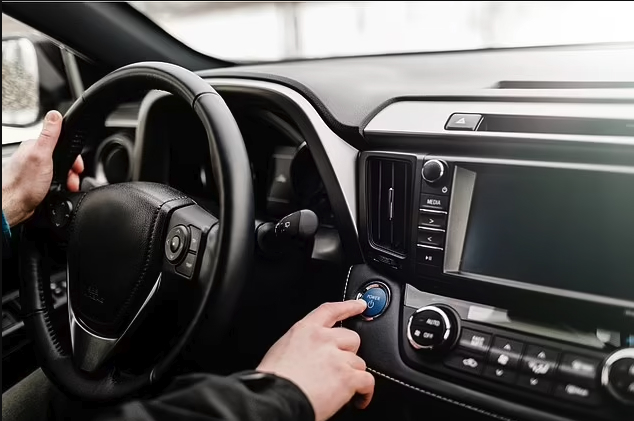- Keyless car technology now accounts for nearly 50 per cent of all vehicle thefts
- Thieves use signal relay devices to trick the car into thinking the key is present
- But, cars with keyless technology only make up one per cent of cars on the road
Keyless cars now make up half of all vehicles stolen despite being 1 per cent of cars on the road.
Thieves use new technology to target owners with widely available signal relay devices that tricks the car into thinking the correct key is present by amplifying its signal.
Once thieves gain access to the vehicle, it can be started and moved in seconds.
Insurance claims for car thefts grew by 20 per cent each year between 2016 and 2019. And keyless vehicles account for an ever-increasing proportion of claims, according to data from LV= Insurers.
Tesla, Lexus, Audi, BMW, Mercedes, Porsche, Jaguar, and Land Rover cars are among the brands increasingly targeted by keyless car thieves.

Thefts of keyless vehicles now account for nearly 50 per cent of all car thefts, according to data from LV= Insurers (stock image)

Managing Director of LV= Heather Smith said: ‘With keyless cars, car technology continues to advance.
‘But unfortunately so do the methods criminals use to steal them, so consumers need to keep on top of new innovations and take extra precautions to ensure they stay one step ahead of criminals who may try and take advantage of them, and their cars.
‘The police can only do so much, so it’s vital that drivers do everything they can to protect their vehicle, especially those driving a luxury or prestige car that is likely to attract attention.
‘Most car theft happens near people’s homes, but with a better understanding of the technology and a few simple security measures, you can make your car a lot less appealing to thieves.’
Theft from cars, involving the theft of parts or possessions from vehicles, has also risen sharply since 2016 – soaring up 140 per cent.
This has primarily been driven by one increasingly attractive part to thieves – the catalytic converter.
It is being stolen for its precious metals – copper, nickel, cerium, iron and manganese – with hybrid vehicles and luxury brands most regularly targeted.
Vehicle crime has increased across the UK’s main metropolitan areas, with London, Birmingham, Nottingham and Greater Manchester seeing the biggest spikes in the last four years.
London has seen the biggest rise, seeing claims rise by 265 per cent since 2016.
Birmingham, Nottingham, and Greater Manchester have seen increases of over 100 per cent.
Car thefts dropped during the pandemic but rose as restrictions eased in the spring and saw a 3.1 per cent increase between May and June this year.
Thefts increased from 6,513 in May to 6,740 in June, according to provisional data from the National Police Chief’s Council.
Last week, TV Presenter Giles Coren’s keyless Jaguar I-Pace was stolen from north London for the second time after it pinched from outside his north London home in April.
He suffered the same fate despite following instructions from the manufacturer and paying out £3,000 for a new tracking system.
Coren’s beloved £65,000 eco-Jag was recovered by Metropolitan police on Friday – 24 hours after detectives closed the case due to a lack of evidence.
It came days after police warned car owners over the rise in keyless thefts as gang was jailed for 23 years for stealing high-performance motors worth £2.6million.
Keyless car thefts and how to prevent them
Keyless theft, also known as ‘relay theft’ occurs when a device is used to fool the car into thinking the key is close by.
This unlocks the car and allows the ignition to be started.
Police warn that every make and model of car which can start ‘keylessly’ is susceptible to a relay attack.
While this might put drivers on edge, there are easy steps you can take to stop you becoming the next victim of a relay theft.
Certain metals are capable of blocking key signals, which means if you store your fob with one of these metals around it, criminals won’t be able to pick them up and steal your vehicle.
The most simple and most ingenious is a metal can.
The aluminum in a drinks can will stop radio signals being transmitted from your key and stop burglars in their tracks.
Some experts have suggested keeping your keys in the fridge, as the material on the inside will block signals too.
If you’re looking for a low-cost option, some people wrap their fobs in tin foil – although this isn’t endorsed by security firms.
Keeping your keys in a small metal box however can work efficiently.
Special faraday pouches — cheap wallets which shield the key’s radio signal from being transmitted — are also useful for storing your keys when you’re away from home – in motorway service stations and public car parks.
Experts also encourage drivers to keep them at least 5m away from their front door, to give thieves the worst chance of being able to relay a signal.
But some security specialists advise against hiding your car keys too obscurely in your house — because if serious criminals truly want to steal your car, they will break in and do anything to find the keys.
Physical barriers such as steering wheel locks and even wheel clamps are all suggested as additional safety measures.
